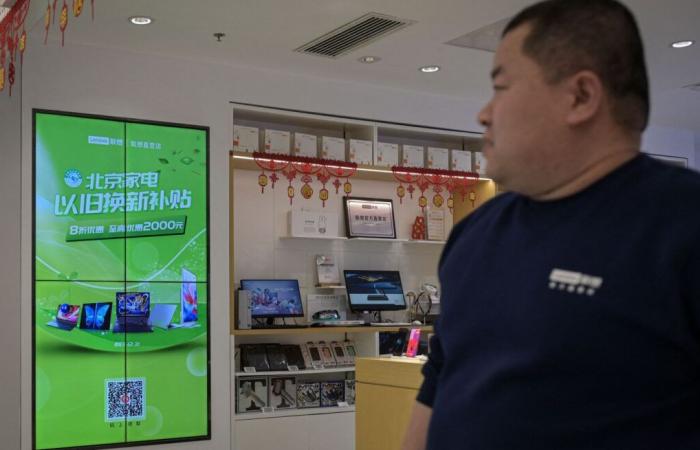Beijing is counting on subsidies for the purchase of rice cookers, microwaves and even smartphones to stimulate consumption and strengthen its economy as Donald Trump’s new term approaches.
The morale of hundreds of millions of Chinese consumers remains weighed down by a long real estate crisis, and political leaders are increasing initiatives to encourage spending.
Latest example: the expansion of a subsidy program for the purchase of household products — ranging from water purifiers to electric cars.
This policy is an “incentive” for Li Ling, 25, interviewed by AFP outside the imposing Sanlitun shopping center in Beijing. “If someone’s budget is not sufficient, these measures might encourage them to make a purchase,” she believes.
Dangers for foreign trade
China is anxiously watching the new term of US President-elect Donald Trump, who has promised to increase customs duties on Chinese imports.
A resumption of trade tensions could deal a severe blow to Chinese foreign trade, one of the pillars of growth of the world’s second largest economy.
Experts believe that China may have to turn to another growth model, more focused on domestic demand.
The government’s new subsidy program saves up to 20% on microwaves, water purifiers, dishwashers and rice cookers, among other things, with a maximum tier of 2,000 yuan ( CA$393).
Electronic products such as cell phones, tablets or smart watches can be subsidized up to 15%.
-Yang Boyun, a customer, says he has benefited greatly from this new program. “I bought three Xiaomi air conditioners,” he tells AFP, referring to the Chinese leader in electronic products. “I bought them for a total of 8000 to 9000 yuan [1570 à 1767 $CA]. Normally, they cost at least 4000 yuan each [785 $CA]. »
Mr. Yang, an employee of the real estate sector – the most affected by the crisis – believes that more radical actions are necessary to reverse the trend. “Only regulatory changes at the macroeconomic level will be felt at the individual level,” he says.
China was to announce several key indicators of its economic growth on Friday, including the amount of gross domestic product (GDP) for 2024. A group of experts interviewed by AFP expect a growth rate among the lowest in recent years. decades.
“Be happy”
In Sanlitun Mall, student Wang Jiaxin said she prefers to focus on products she likes. “If it was to eat or drink, or to buy nice clothes, then I would spend a little more,” she says.
The young woman explains that she wants to enter the job market — marked by high unemployment rates among young people — next year, rather than continuing to study. But she is only moderately optimistic.
“I can definitely get a job.” But what type of work? she said. I’m not sure I’ll be able to find a good job, but I will be able to earn a living. »
The employee Mr. Yang explains that he has changed his consumption habits. “I used to have a little money saved, but now I feel like the smallest thing could lead me into debt — for example, if you get sick, you go into debt . »
“But the money should be used to enjoy the present time,” he adds. And “the most important thing for us right now is to be happy.”






